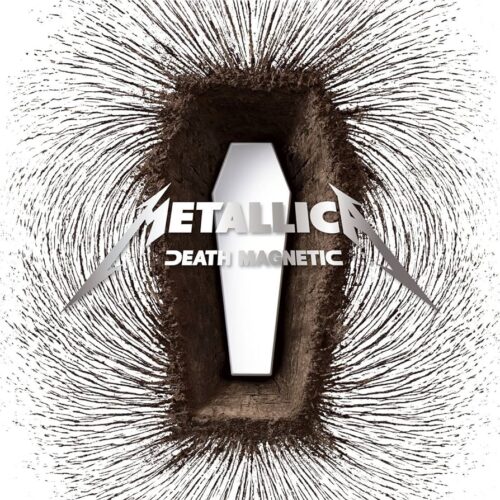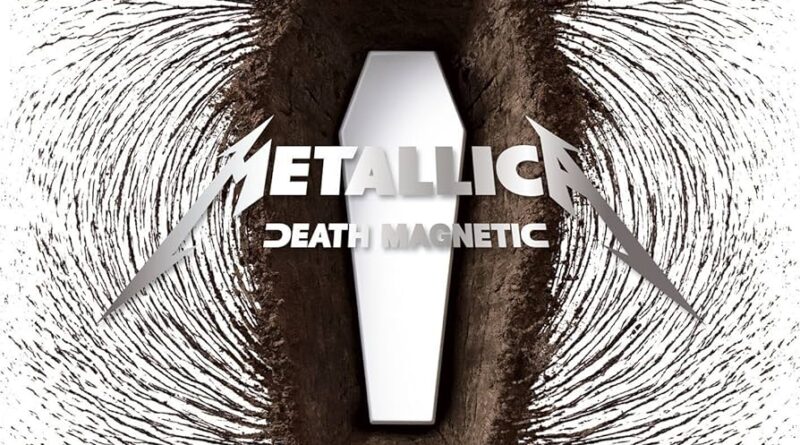HEAVY MUSIC HISTORY: Death Magnetic – Metallica
The biggest metal band the world has ever seen had something to prove with Death Magnetic (2008). Their backs weren’t against the wall or anything; this is a band that had released the critically panned St. Anger (2003) and had survived accusations of waging war against their fanbase by suing Napster, and yet had never seen their popularity wane. Still they sat atop festival bills and sold out humungous venues in cities all over the world, such is the power of all that goodwill accrued in the first ten years of METALLICA.
But was that all there was to be? Like other marquee names from the same era, METALLICA risked becoming a legacy act who, despite impressive sales with each new release, would forever rely on 80s classics to see them through. No one would begrudge them for it – Master Of Puppets (1986) is that damn good. There has always been a sense, though, that James Hetfield (vocals/guitar) and Lars Ulrich (drums) long to stay ahead of the pack. St. Anger may not be their finest hour, but it was a daring piece of work. Undoubtedly influenced by the prevalence of nu metal at the time, especially its absence of solos, it was a world away from METALLICA by the numbers. And, if it wasn’t exactly to everyone’s tastes, at the very least it was a personal triumph. They worked through Jason Newstead’s (bass) departure and Hetfield’s prolonged stint in rehab, and came out the other side more harmonious than ever before. The interpersonal respect and camaraderie that stemmed from their most controversial album seems to have lasted to this day.
Death Magnetic, now 15 years old, was a change of tack. Instead of continuing to reach for something new, they looked to the past with refinement in mind. How to make what is old new again? Not since …And Justice for All in 1988 had METALLICA riffed so hard, so fast, and with such complexity. In fact, you would be forgiven for thinking Death Magnetic is a direct sequel to Justice with its jagged edges and its technical prowess.
Back as well was that classic METALLICA album structure. Track 1, come out with all guns blazing. Track 4, slow things down and make it epic. That blueprint made That Was Just Your Life the fastest 7 minutes in thrash metal history, and The Day That Never Comes updates One’s formula with its gentle first half giving way to machine gun-like palm-muting as the drama intensifies.
The band have stayed the course ever since. Hardwired… To Self-Destruct (2016) picks up where Death Magnetic leaves off, trimming some of the record’s fat, and 2023’s 72 Seasons is more primitive still, attempting to recreate thrash’s Big Bang.
For better or for worse, Death Magnetic was the moment METALLICA course corrected. They got back to speaking a language they had long ago written the dictionary for. But the world around them had changed too. Nu metal quickly become an embarrassment, and guitar-driven metalcore was having its day in the sun. Emerging acts like TRIVIUM and BULLET FOR MY VALENTINE worshipped at the church of early METALLICA and had shot to great success. Maybe Hetfield and Ulrich thought to let the world know they weren’t giving up their throne just yet, or maybe they saw what way the wind was blowing. Either way, the middle of the decade was a fertile time for the scene, with its high point coming a year before Death Magnetic with the release of MACHINE HEAD’s The Blackening (2007). They would go on to support METALLICA on the World Magnetic tour, at the height of their powers, giving the headliners a run for their money with Clenching The Fists Of Dissent and Halo showing how thrash can still sound vital in the 21st century.
But while MACHINE HEAD have had an identity crisis in the years since, METALLICA have kept it together. If ever the band’s credentials were in doubt post-St. Anger, they were put to bed with Death Magnetic. Opinions on their more recent records still vary, but their current world tour is a sign of a band who, on stage at least, are at the top of their game. Tens of thousands of people pack out football fields to see the metal titans play two unique sets in each city, and they make it look easy.
Death Magnetic fans will be disappointed, however, with only The Day That Never Comes featuring regularly in setlists these days. Cyanide has continued to make an appearance once or twice a year. The End Of The Line was brought back for one night only in celebration of the band’s 40th anniversary in 2021, while The Unforgiven III was dusted off for their S&M2 concerts. Despite relative acclaim at the time, the band have to contend with a fanbase mostly familiar with – and paying tickets to see – the hits.
Fifteen years later, Death Magnetic is still an impressive piece of work – although, it is a noticeably loud piece of work, criticised at the time for being part of a trend where everything fights to be louder than everything else (oddly, the Guitar Hero version’s mix was highly praised). Despite this, All Nightmare Long shines as the album’s centre piece, which is an instantaneous and anthemic gem among some technical clinics, like Cyanide’s sudden gear shifts and The Judas Kiss’ erratic pulse. Hetfield has written better lyrics in all stages of the band’s career, but as a statement that METALLICA has still got it – the power, the attitude, the sheer majesty – the album is more than good enough to sit alongside some all-time classics.

Death Magnetic was originally released on September 12 2008 via Warner Bros. Records.
Like METALLICA on Facebook.
